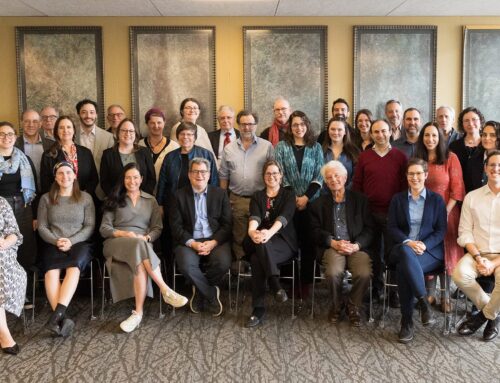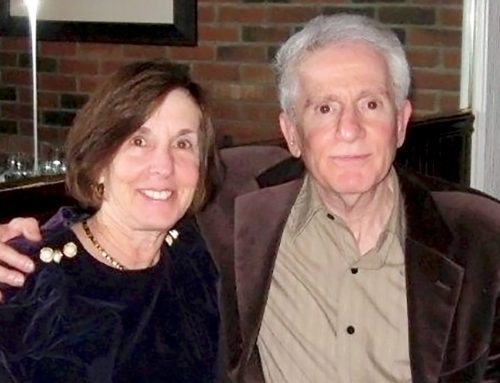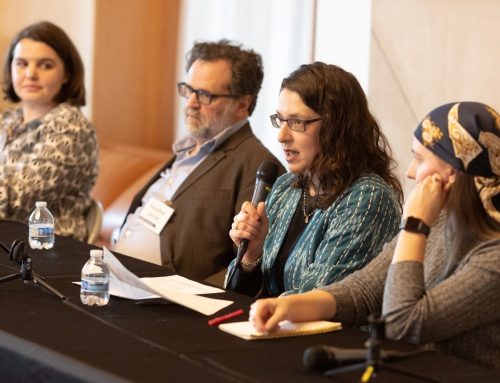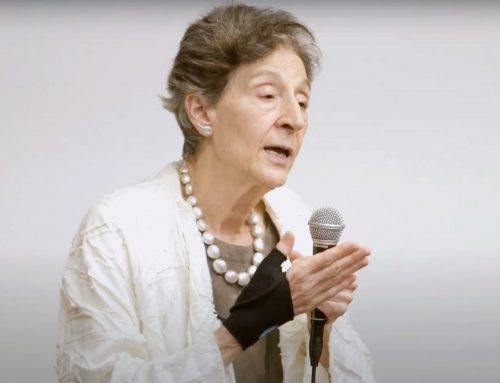In 1975, a student at the University of Washington Medical School was introduced to Sephardic culture in Seattle. Inspired by the Ladino language, literature and music, David Raphael captured scenes of Sephardic life in Jerusalem and Seattle in his cult film Song of the Sephardi. Throughout the film, he asks the question: How long will the Ladino language and culture last?
Nearly forty years after the film’s premiere, Seattle community members gathered together at the fourth annual International Ladino Day to revisit the film and a world that seems to have faded into history. Following the film’s screening, Professor Devin Naar asked panelists Judith Amiel, David E. Behar, and Hazzan Isaac Azose, all of whom appeared in the film, and Makena Owens, a graduate student in Jewish studies at Yeshiva University who comes from a Sephardic family, “Are there more verses to Song of the Sephardi yet to be composed?”
We are pleased to share the video recording of this panel discussion about the past, present and future of Sephardic culture and the Ladino language from our fourth annual International Ladino Day celebration hosted by the Stroum Center for Jewish Studies and the Sephardic Studies Program on November 30, 2016.
This event was made possible by the generous support of the Lucie Benveniste Kavesh Endowed Fund for Sephardic Studies and co-sponsored by The Seattle Sephardic Network, Congregation Ezra Bessaroth, Sephardic Bikur Holim Congregation, and the Seattle Sephardic Brotherhood.
We are grateful to our panelists and to all of the members of Los Ladineros who performed Ladino songs at this special event: Marcelle Adatto, Ralph Adatto, Vivian Adatto, Regina Amira, Vic Amira, Sylvia Angel, Luis Antezana, Hazzan Ike Azose, Jack Cordova, Lilly DeJaen, Menache Israel, Cheryl Lundgren, Al Shemarya and Marlene Souriano-Vinikoor.
Join us on November 11, 2017 for the fifth annual Ladino Day celebration, which will revolve around a concert by the acclaimed Ladino singer from Israel, Yasmin Levy. Afterwards, Prof. Devin Naar will lead a discussion with Yasmin about the role that Ladino has played in her life and the past and future of her artform.
Selected Clips
Links for Further Exploration:
View all the photos from the 2016 Ladino Day celebration on SmugMug
“Song of the Sephardi: New Verses for the 21st Century?” by Devin Naar
“A Walk Down Sephardic Memory Lane: Reflections on Ladino Day” by Ty Alhadeff
In 1975, a student at the University of Washington Medical School was introduced to Sephardic culture in Seattle. Inspired by the Ladino language, literature and music, David Raphael captured scenes of Sephardic life in Jerusalem and Seattle in his cult film Song of the Sephardi. Throughout the film, he asks the question: How long will the Ladino language and culture last?
Nearly forty years after the film’s premiere, Seattle community members gathered together at the fourth annual International Ladino Day to revisit the film and a world that seems to have faded into history. Following the film’s screening, Professor Devin Naar asked panelists Judith Amiel, David E. Behar, and Hazzan Isaac Azose, all of whom appeared in the film, and Makena Owens, a graduate student in Jewish studies at Yeshiva University who comes from a Sephardic family, “Are there more verses to Song of the Sephardi yet to be composed?”
We are pleased to share the video recording of this panel discussion about the past, present and future of Sephardic culture and the Ladino language from our fourth annual International Ladino Day celebration hosted by the Stroum Center for Jewish Studies and the Sephardic Studies Program on November 30, 2016.
This event was made possible by the generous support of the Lucie Benveniste Kavesh Endowed Fund for Sephardic Studies and co-sponsored by The Seattle Sephardic Network, Congregation Ezra Bessaroth, Sephardic Bikur Holim Congregation, and the Seattle Sephardic Brotherhood.
We are grateful to our panelists and to all of the members of Los Ladineros who performed Ladino songs at this special event: Marcelle Adatto, Ralph Adatto, Vivian Adatto, Regina Amira, Vic Amira, Sylvia Angel, Luis Antezana, Hazzan Ike Azose, Jack Cordova, Lilly DeJaen, Menache Israel, Cheryl Lundgren, Al Shemarya and Marlene Souriano-Vinikoor.
Join us on November 11, 2017 for the fifth annual Ladino Day celebration, which will revolve around a concert by the acclaimed Ladino singer from Israel, Yasmin Levy. Afterwards, Prof. Devin Naar will lead a discussion with Yasmin about the role that Ladino has played in her life and the past and future of her artform.
Selected Clips
Links for Further Exploration:
View all the photos from the 2016 Ladino Day celebration on SmugMug
“Song of the Sephardi: New Verses for the 21st Century?” by Devin Naar
“A Walk Down Sephardic Memory Lane: Reflections on Ladino Day” by Ty Alhadeff







Thank you for this tribute and annual conference on ladino. The film song of Sephardi for 30th anniversary remembrance was shown at Sephardic bikur holim synagogue with Rabbi Maimon in attendance. My father Dr David Raphael gave a speech where I remember he mentioned had he had more funding the film would gave been 2 hours, more subtitles, and created under less deadline pressures. He was proud of the film and honoring the Sephardic community of Seattle
Mr. Alhadeff,
Is your family name from the Island of Rhodes?
Jack Galante Lascar